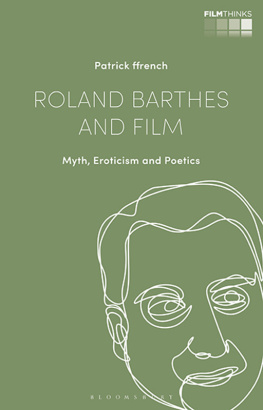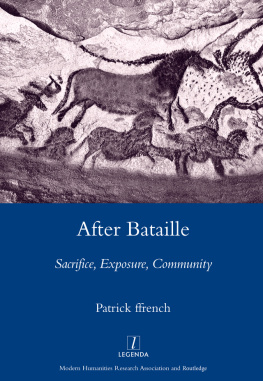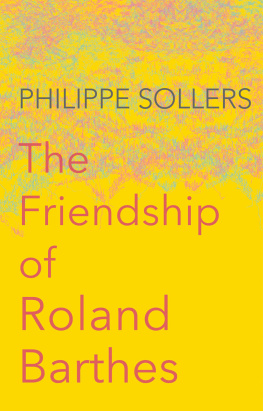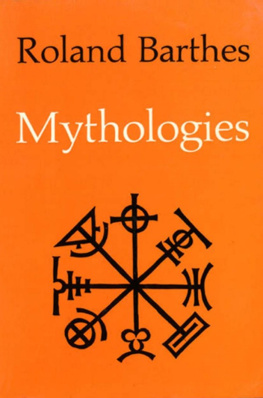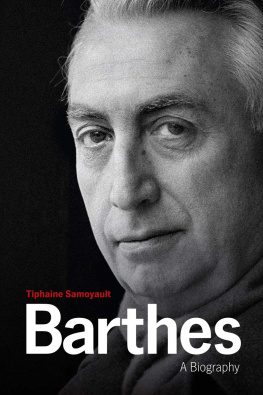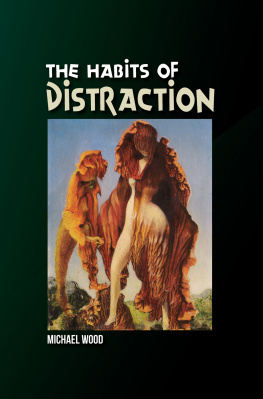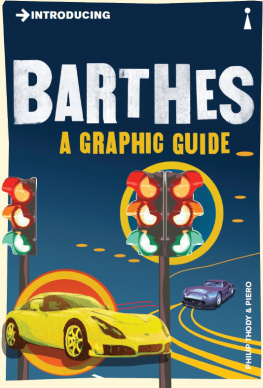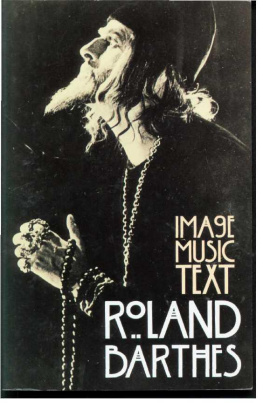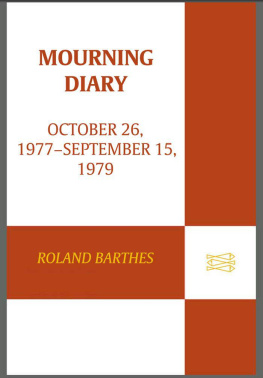ROLAND BARTHES AND FILM
ROLAND BARTHES AND FILM
Myth, Eroticism and Poetics
Patrick ffrench


Series Editors:
Lcia Nagib
Professor in Film at the University of Reading
Tiago de Luca
Associate Professor in Film & Television
Studies at the University of Warwick
Advisory Board:
Martine Beugnet, Universit Diderot Paris
Thomas Elsaesser, University of Amsterdam
Catherine Grant, Birkbeck University
D.N. Rodowick, The University of Chicago
gnes Peth, Sapientia University
David Martin-Jones, University of Glasgow
Philip Rosen, Brown University
Laura U. Marks, Simon Fraser University
Film Thinks is an original book series that asks: how has lm inuenced the way we think? The books in this series are concise, engaging editions written by experts in lm history and theory, each focusing on a past or present philosopher, thinker or writer whose intellectual landscape has been shaped by cinema. Film Thinks aims to further understanding and appreciation, through sophisticated but accessible language, of the thought derived from great lms. Whilst explaining and interpreting these thinkers ideas and the lms at their origin, the series will celebrate cinemas capacity to inspire and entertain and ultimately to change the world. Aimed at lm fans as well as specialists, Film Thinks is devoted to knowledge about cinema and philosophy as much as to the pleasure of watching lms.
Published and forthcoming in the Film Thinks series:
Adorno and Film: Thinking in Images
By James Hellings
Georges Didi-Huberman and Film: Politics of the Image
By Alison Smith
Nol Carroll and Film: A Philosophy of Art and Popular Culture
By Mario Slugan
Roland Barthes and Film: Myth, Eroticism and Poetics
By Patrick ffrench
Slavoj iek and Film: A Cinematic Ontology
By Christine Evans
Stanley Cavell and Film: Scepticism and Self-Reliance at the Cinema
By Catherine Wheatley
Queries, ideas and submissions to:
Series Editor: Professor Lcia Nagib
Series Editor: Dr Tiago de Luca
Senior Commissioning Editor at Bloomsbury: Anna Coatman Anna.Coatman@bloomsbury.com
I want first of all to acknowledge the inspirational example of Annette Lavers, the first translator of Barthes and one of the finest and most acute readers of his work, who first introduced me to it as an undergraduate at University College London. Closer to the present, Nikolaj Lbecker was instrumental in the initial stages of the book, and in providing essential feedback at later stages. The editorial staff at I.B. Tauris and BloomsburyMaddy Hamey-Thomas, Rebecca Barden, Rebecca Richards, and Anna Coatmanhave provided excellent support throughout the whole process. Cinthya Lana offered expert and invaluable help in procuring the images and permissions. Roland-Franois Lacks encyclopedic knowledge and generous advice were crucial. Kate Ince kindly shared her work on filmology which has informed my account. Barnaby Dicker has been an important interlocutor throughout. Tom Baldwins friendship and intellectual generosity have been invaluable. Thank you to Fabien Arribert-Narce for the invitation to Aoyama Gakuin University, Tokyo, and to Patrick Crowley and Shirley Jordan, for the invitation to a conference in honor of Michael Sheringham, where I presented early versions of some of the chapters. I also thank the four anonymous reviewers enlisted by Bloomsbury Press for their generous and incisive comments. Beyond this the book has benefited from innumerable conversations and exchanges around Barthes and cinema with colleagues and friends. This list would be too long, but I would like to acknowledge the following in particular: Catherine Wheatley, Colin McCabe, Diana Knight, Giovanni Menegalle, Igor Reyner, James Williams, James Wishart, Jo Malt, Johnnie Gratton, Jules O Dwyer, Lucy OMeara, Mark Shiel, Michael Sheringham, Nigel Saint, Richard Mason, Ros Murray, Simon Gaunt, Simone Ventura, Sophie Eager, Timothy Matthews, Tom Baldwin, Tom Gould. As always the Department of French at Kings College London and the Faculty of Arts and Humanities of which it is a part have been a vital and convivial environment in which to work, and I thank all of my friends and colleagues there. Finally I want to thank Sarah and Laurence for bearing with me throughout the whole process and for their grounding pragmatism and care.
***
The author and publisher gratefully acknowledge the permission granted to reproduce the copyright material in this book.
For permission to reproduce Jacques-Andr Boiffard, Big Toe (Male Subject, 30 years old) (Gros orteil [Sujet masculin, 30 ans]). Centre Pompidou, Muse National dArt Moderne, Paris Mme Denise Boiffard. Image CNAC/MNAM/Dist - Grand Palais
Every effort has been made to trace copyright holders and to obtain their permission for the use of copyright material. The publisher apologizes for any errors or omissions in the above list and would be grateful if notified of any corrections that should be incorporated in future reprints or editions of this book.
References to Barthes work and to other sources will be to published English translations where available. All other translations are my own. References to the original French of Barthes work will be added where appropriate and will for the most part be to the five volumes of Barthes uvres compltes, edited by ric Marty (Paris: Seuil, 2002).
In a radio interview with Jean-Marie Benoist and Bernard-Henri Lvy in 1978, asked about the relation of the pleasure of the text to the pleasures of the image Barthes confessed that for him the pleasures of the image were very ambiguous, and that part of this ambiguity revolved around the difference between the fixed image and the mobile image. This difference, Barthes continues, has a role to play in all of his troubles with the cinema. He has always been, he says, uneasy (rtif) about the cinemahe has trouble going to it and speaking about it, while he is attracted by everything that has to do with photography and painting. Nevertheless, Barthes continues, he has wondered for a long time about the reasons behind his resistanceit is not that the cinema makes him anxious; rather, he adds, he is bored by it, despite the fact that there are a number of directors who he loves, exceptions to the rule. His boredom, he says, is an aesthetic prejudice, anchored in the body, in the value-system which belongs to the body, and it derives from the impression that the cinema is too rich; too many things happen, even in a single minute of the mobile imagethis exhausts him (cela mpuise). This evaluation is connected, moreover, to his taste for interruption, the taste for brief forms, the taste I have for litotic representations, elliptical representations, the taste for brevity, for the burst, the flash, for what appears and then disappears. The aesthetics proffered by his body, Barthes proposes, compel him to seek ravishment, rapture, exactly as in the scenario of love, which he then conceptualizes as enamoration.
At first glance Barthes statements here might appear to condemn any substantial engagement with his thinking about cinema to being a minor issue at best and a fruitless pursuit at worst. Barthes fundamental disdain for, or worse, his boredom with the moving image would suggest that it just does not excite the intellectual and curiosity and the analytic passion which he brought to bear so intensively on so many other areas of cultural life. Yet toward the end of Barthes response there is a curious turn in the enthusiastic listing of the reasons for his Moreover, Barthes attention to his own resistance, to the question posed by his own resistance, reproduces a critical tension within film itself, and within film theory, between its status as moving image and as narrative, and its status as photogrammatic materiality, a tension which resolves acutely onto the symptom of the still or the photogram.
Next page
